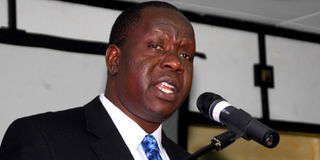Why govt won’t touch mobile telecom firm

ICT Cabinet Secretary Dr Fred Matiang'i. He is threatening to throw the book at any telecommunications service provider that does not adhere to the network quality threshold set by the regulator, the Communications Authority of Kenya (CAK). PHOTO/FILE
What you need to know:
- Dr Matiang’i has noted that the quality issues could result in fraud, especially where dropped calls cost users the full terminating fee, which is never refunded.
- The most severe punishment the government could mete out on Safaricom is a fine. There are a number of reasons.
- Safaricom puts the most amount of money into government through tax than any other corporation in the country.
ICT Cabinet Secretary, Dr Fred Matiang’i, is threatening to throw the book at any telecommunications service provider that does not adhere to the network quality threshold set by the regulator, the Communications Authority of Kenya (CAK).
Dr Matiang’i has noted that the quality issues could result in fraud, especially where dropped calls cost users the full terminating fee, which is never refunded.
Even Safaricom, the biggest mobile telecom service provider, has been reminded that CAK could terminate its operating license, if it feels that the quality of service is not up to standard.
True, the telecoms regulator could withdraw any operator’s license, but in Safaricom’s case, I doubt they can.
The most severe punishment the government could mete out on Safaricom is a fine. There are a number of reasons.
Shareholding
Safaricom is still partly owned by the government, which thus obtains shareholder’s benefits, quality of service notwithstanding.
It is therefore in the government’s best interests that Safaricom keeps operating. The government will never severely reprimand Safaricom.
For the government to effectively punish Safaricom for one reason or another, that relationship must come to an end.
Tax
Safaricom puts the most amount of money into government through tax than any other corporation in the country.
Safaricom all but guarantees billions to the Kenya Revenue Authority, and delivers every year.
Recently, the company announced a cool Sh23 billion in profits for its financial year that ended in March.
A corporation of that magnitude that puts a fair portion of the bread on Kenya’s table has a lot more leeway in what they can do.
The government needs Safaricom’s tax to keep coming in. A shutdown of the company would mean a significant reduction in government revenue.
M-Pesa
Then there is M-Pesa, Safaricom’s money machine.
Finally, Safaricom will be operating Mpesa locally, with the help of a couple of Chinese engineers.
For operations sake, it is wonderful for Safaricom and for Kenyans as well. We can expect better performance, reduced delays and wishfully, reduced costs.
Safaricom needs Mpesa. Kenyans need Mpesa too. It still remains the most efficient way to send money from one party to another. It has become a popular mode of payment.
If Mpesa were to be withdrawn today, Kenya’s economy would suffer a significant shock, even if, temporarily so. That is a risk the government would not dare, no matter the odds.
Government contracts
The government must be suffering from Stockholm Syndrome.
On the one hand, it threatens Safaricom over quality issues. On the other hand, it goes ahead to award the company a contract as sensitive a matter as security.
The company recently pitched and secured a deal with the government to provide a complex national security communication infrastructure.
Clearly, the government threats against Safaricom are pointless. It still has such unwavering faith in the company to grant it the contract.
Poor execution history
The regulator itself is partly to blame for never having put its foot down. Complaints over network quality issues are not new.
They date back several years, even more than 10, and the regulator failed then. CAK is unlikely to win this one either.
History, money, politics, and influence are all on Safaricom’s side, including a good portion of the country’s population.
While Safaricom may have genuine technical challenges in achieving the desired quality, money is a driving factor and the quality Safaricom should be offering would certainly impact profits.
2015, the company will add more to the government’s coffers.
The cabinet secretary will issue threats, but I doubt if they will lead to much change.




